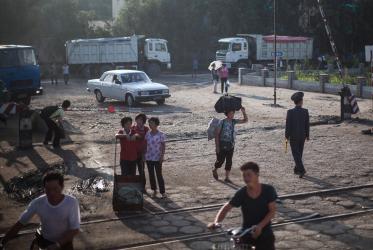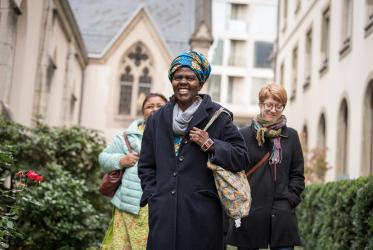Dear Sisters and Brothers in Christ,
I bring greetings to you on behalf of the World Council of Churches at the inauguration
of the International Consultation on Peace in the East Asia Region. The
Consultation convened by the Presbyterian Church of the Republic of Korea
(PROK) comes at an appropriate time. The Six Party Talks have run into difficulties.
This has brought on a stalemate not only in the Korean peninsula, but in
the East Asia region as well.
The initiative taken at the 89th PROK Assembly in 2004 to set up a Peace
Community Movement Centre (PCMC) to articulate the theological vision of
peace and internalize the peace movement in the daily lives of the people must
be appreciated and applauded. It has all promise and potential to reinvigorate and
strengthen the work of peace and reunification of the Korean peninsula and its
people. This can, however, only happen if the Korean people are fully behind this
new initiative, which I am certain they are. On behalf of the WCC and its member
churches I take the opportunity to reiterate our commitment to the peaceful
reunification of the Korean peninsula.
Peace-building strategies normally fall between two categories that may be
described respectively as "international regimes" and "in-country" peace-building.
The former, like the Six Party Talks, embraces more than one country, the
latter refers to efforts, sometimes internationally, to build conditions for peace
within particular countries. The PROK consultation is one such "in-country"
initiative to strengthen the people-to-people movement on both sides of the peninsula
for peace and reconciliation and to shed years of hatred and antagonism.
As you probably know, the World Council of Churches has a long history of
involvement in the Korean peninsula. It has accompanied the Korean people and
churches in their pursuit of peace, justice and unification. The Tozanso framework
of 1984 provided a mechanism for the churches not only in the Korean
peninsula, but also in other regions, like Europe, Asia and North America, to
work together in efforts to promote peace in this part of the region.
There have been many hurdles to peace in the peninsula. We are therefore happy
to note that both North and South Korea despite difficulties have continued to
build and strengthen bilateral relations. These have grown extensively in the field
of economic cooperation. In order to move this process of engagement and dialogue
further, we are of the considered view that the United States should engage
the DPRK to give security assurances, stop the policy of isolating the country,
and stop playing on the fears of the people. The time has come when normalization
of relations between the two countries should take place. Without reconciliation
between the USA and DPRK, the possibilities of diffusing tensions in the
region will always remain remote and this in turn will be a setback to any peace
initiatives in the peninsula as well as in the region.
The World Council of Churches is also of the considered opinion that humanitarian
support for food, medicine and other inputs to North Korea should be continued
by Japan, the US, Europe and other countries without conditions. These
efforts will help to mitigate the suffering of the people in the North.
I wish you a successful consultation that will contribute to the movement for
peace and reunification.
Yours in Christ,
Rev. Dr Samuel Kobia
General Secretary
Related content


